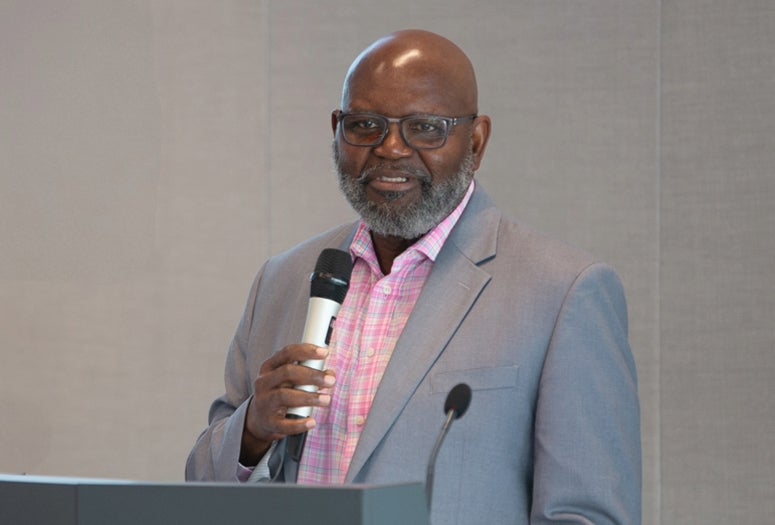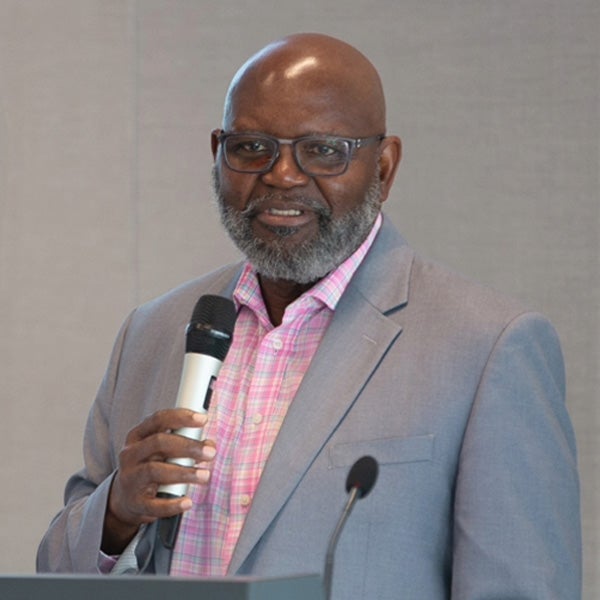
State and local health departments across the U.S. have a wide range of responsibilities and are critical in safeguarding the public from communicable diseases and environmental contaminants. The recent pandemic put tremendous strain on this complex network, revealing both strengths and limitations.
"Managing and responding to infectious disease outbreaks like the COVID-19 pandemic presented seemingly insurmountable challenges, but I also saw challenges bring about resilience and innovation," said Stephen L. Williams, director of the Houston Health Department (HHD).
Williams retires this August after 21 years of active leadership at the HHD, one of the nation's largest full-service health departments.
In an inspiring keynote address at the Cross-Sector Wastewater Surveillance Workshop on August 6, 2025, Williams outlined the immense role wastewater-based epidemiology has played in Houston as an early-warning system to track viral outbreaks, communicate actionable information, and mobilize targeted interventions.
Two CDC National Wastewater Surveillance System (NWSS) Centers of Excellence from Houston and North Carolina, as well as the Water Environment Federation, co-hosted the event. This was the second year the workshop was hosted at Rice University for an interdisciplinary group of experts from health departments, public, academic, private industry laboratories, and wastewater utilities at the new Ralph S. O'Connor Building for Engineering and Science.
Over five years after the emergence of COVID-19, Williams said, "Monitoring wastewater for SARS-CoV-2 trends has proven to be an efficient way to detect community-level disease dynamics. The system is now being scaled for up to 29 additional health threats. I am proud of the work we have done!"
The building and implementation of Houston's wastewater monitoring infrastructure has involved multi-institutional collaborations between HHD, Houston Public Works, and scientists and engineers at Rice University.
Williams credits David Persse, MD, for the crucial and multifaceted role he has played as the public health authority for the city and the EMS director.
"Dr. Persse is uniquely positioned to orchestrate the medical aspects of clinical care quality management, disease control, and public health preparedness," Williams said.
There are currently six CDC-NWSS Centers of Excellence located in California, Colorado, Houston, New York, North Carolina, and Wisconsin that, through a collaborative partnership with academic and utility partners, serve as regional leaders in wastewater surveillance implementation and coordination.
"Being a Center of Excellence has been tremendously rewarding, knowing we are building sustainable programs that support the growth of resilient and adaptive communities," said Williams.
Williams' keynote comes at a time when several public health threats have been gaining prominence, such as the resurgence of measles in the U.S., one of the most contagious human viruses.
Recent innovation led by Houston's Center of Excellence core team member and Rice environmental engineer Lauren Stadler has enabled the ability to distinguish between wild-type measles, which signals infectious cases, and the vaccine strain, preventing false alarms from vaccine-related shedding.
"This year, measles cases in the U.S. hit their highest level since the disease was declared eliminated in 2000. Wastewater surveillance is an accurate defense system to detect, inform, and direct resources and encourage vaccinations," Williams said.
Despite successes in wastewater-based epidemiology and improved communication within the public health system and to the public at large, the country faces difficulties in moving forward.
"There is a resistance to science in public health fueled by misinformation and conspiracy theories that undermine efforts. This issue has serious consequences," Williams said.
When asked about addressing these challenges, he added, "The success of wastewater monitoring programs started with people wanting to help people, putting differences aside, and working together to make positive change happen for the benefit of our communities."
Moving forward hinges on "Understanding sensitivities people have about privacy and having conversations about ethical frameworks that protect people's rights," said Williams.
In addition to city-wide monitoring through 39 wastewater treatment plants that serve 2.3 million people, Houston's communities benefit locally from facility-level surveillance through collection sites for 47 schools in the Houston Independent School District, nursing homes, homeless shelters, and the county jail.
The preK-12 School Virus Alerts program has monitored for SARS-CoV-2 since December 2020 and was expanded to include influenza and respiratory syncytial virus (RSV) in November 2021 and September 2022, respectively.
In his overall role as HHD director, Williams has been actively involved in local, state, and national public health issues. He has worked with four city mayors.
"In recent years, local health departments have been on the front lines of emergency response for issues related to climate change, environmental contamination, and infection outbreaks," said Williams.
To help reduce the spread of COVID-19, free testing sites were available during the pandemic to everyone.
Programs close to Williams' heart implemented under his leadership include My Brother's Keeper, a program for young men of color. Other ambitious pograms included the children's vision program See to Succeed, the nationally recognized community health program Assessment, Intervention and Mobilization (AIM), and the children's dental program, Project Saving Smiles.
In addition to Houston's wastewater monitoring program, Williams has leveraged other impactful HHD-Rice University initiatives with Loren Hopkins, chief environmental scientist and bureau chief of the Data Science Division at the HHD and professor in the practice of statistics at Rice, and Katherine Ensor, Rice's Noah G. Harding Professor of Statistics, to understand the economic, mental, and physical health impacts of floods in Texas. These collaborations have also worked to reduce public health impacts from air pollution and advance environmental protection from contamination.
Williams is a fellow at Rice's Baker Institute for Public Policy and serves on the COVID-19 Expert Vaccine Allocation Panel (EVAP), which was created by the Texas Department of State Health Services (DSHS) in November 2020. He serves on several boards of community, professional, and civil rights organizations. He is a past president of the Texas Association of Local Health Officials.
Before his role as director of HHD, Williams was an administrator of public health and deputy director of Travis County's Health and Human Services and Veteran Service Department in Austin, TX.
Williams was born in Waycross, Georgia. He earned his B.A. in Sociology and Social Work from Huntingdon College in Montgomery, Alabama, in 1977. He received his Master of Education from Auburn University at Montgomery and his Master of Public Administration from Baruch College, City University of New York, through the National Urban Fellowship program.
- Shawn Hutchins, Communications Specialist

